Edie Melson's Blog, page 170
March 9, 2021
Learning How to Conduct an Interview – An Important Part of the Writer’s Tool Kit
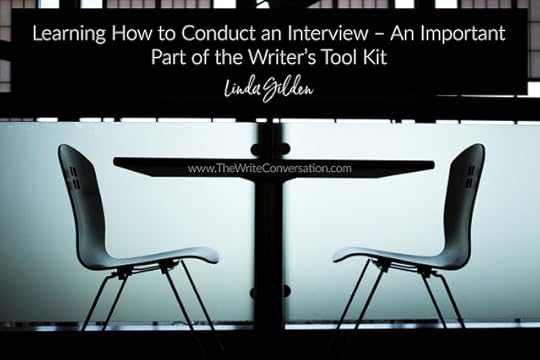
by Linda Gilden @LindaGilden
One of the greatest tools writers have in their tool kits is the interview. You do not necessarily have to do an hour-long interview to receive great benefit to your articles. Quotes from individuals strengthen your points and let your readers know that even if you are not an expert on the subject you know people who are well-versed and you work hard to make the connection.
Here are several reasons the interview helps writers make their articles stronger.The opinion of someone else validates your subject and adds value to the material. Interviewing someone who is knowledgeable in your subject broadens the scope of your reach and helps more people personally identify with your subject.An expert brings extra meaning to your article and gives credibility to your subject. Even if your article is not an academic one, having a quote from an expert let’s the reader know that there is deeper knowledge to be had if they want to pursue it.Quotes show how your subject can be applied to daily life. If you are writing an article on building a house, yet you have never built a house, having a quote or a sidebar from a builder will bring the human element into your writing. Likewise, if you are writing on running marathons and have never run one, seek out a marathon runner who cannot only read your article and verify key elements, but he or she can also provide firsthand experience to illustrate your points.Often when you interview someone for a quote to go in an article, you find an aspect of the subject that you didn’t even think to include. So, talking to others helps you strengthen your outline and not leave out important parts.Those you include in your article will become enthusiastic marketers for your work.Even if you only contact someone for a quote, remember your manners and be respectful of their time. Be sure to write a thank you note. Send them a copy of the published article and let them know where they can get copies or find it online.
If there are parts of your conversation you aren’t able to use for this article, file it away to use another time for a different article. Never throw anything away because you never know when you may have an opportunity to use it!
A few tips for a good interview.Do your homework before you go. Don’t ask your subject something you could have read in the newspaper!Arrive with key questions you would like answered.Record your conversation (with permission) so you can make sure your quotes are correct.If you ask for an hour of time, stay true to that. Do NOT go over the amount of time you ask for.Be sure to write a thank you note to your subject. Once the article is printed, send another short note with a copy of the article.TWEETABLELearning How to Conduct an Interview – An Important Part of the Writer’s Tool Kit - @LindaGilden on @EdieMelson (Click to Tweet)
 Linda Gilden is an award-winning writer, speaker, editor, certified writing and speaking coach, and personality consultant. Her passion is helping others discover the joy of communicating with excellence. In the midst of all the busyness, Linda’s favorite activity is floating in a pool with a good book surrounded by splashing grandchildren—a great source of writing material! www.lindagilden.com
Linda Gilden is an award-winning writer, speaker, editor, certified writing and speaking coach, and personality consultant. Her passion is helping others discover the joy of communicating with excellence. In the midst of all the busyness, Linda’s favorite activity is floating in a pool with a good book surrounded by splashing grandchildren—a great source of writing material! www.lindagilden.com
How to Become a Writing Conference Faculty Member

by Cindy Sproles @CindyDevoted
As a conference director, I receive tons of requests to be faculty. Selecting teachers is always a tough job, one I dread passionately. Throughout the year, I meet hundreds of writers who have great “presence” but don’t have a great command of the craft. I look at a career in writing as rungs on a ladder. We begin at the bottom and learn to write. Hopefully, we gain experience and knowledge which moves us up a notch. Then we’re asked to teach. Mentor. Guide. The gamut of requests is huge and as much as I’d love to have everyone teach, there is more to teaching than charisma. It’s time we address exactly what conference directors look for when extending teaching invitations?
What Conference Directors Look for in FacultyCommand of the craft: Like any teaching situation, it’s important faculty members have a command of the writing craft. It’s important to remember we are charged to train new writers and refine seasoned ones so having faculty who are well versed in the knowledge of the craft is vital. Some of the worst advice I’ve received as a writer came from a conference where the director didn’t do their homework. A faculty member told me that telling a publisher they were losing out because they rejected my work was an important tactic in becoming published. (Palm slap to the forehead.) No, no, no. First, writing is a skill not, a military action. Secondly, there are no “tactics”, only skill and ability. If you want to burn a bridge (which could be considered a necessary military skill at some point), then try threatening a publisher or editor with that “tactic” and see how far it gets you.
Choosing faculty who have a command of writing and the industry requires doing some homework. Directors must be sure those they choose to serve are offering good teaching and accurate knowledge. If you are new to writing, chances are, you’re not going to be invited to be faculty. Spend time honing the craft so that your writing smoothes on the page like butter on bread. Gain experience.
Published authors are better teachers: That would be nice to say but it’s not always true. In today’s world, authors can publish themselves at a whim. I’ve had a few faculty members who haven’t published books but who have proven their skill by writing tons of articles and amazingly well-crafted blog posts. They understand the process of publishing in both self-publishing and traditional publishing. They can discern well and teach good and unique angles. Many editors (and some agents) aren’t published book authors but their knowledge is extensive in publishing. Their gift and love lays within the mechanics of writing and in the business end of publishing. They are avid readers, understand a plot, character development, and yes, the Chicago Manual of Style. They understand the ins and outs of the industry. Everyone does not have to be a published author, but they do need to understand the industry and, again, have a command of the craft.
Writers and speakers and vice versa: You’ve heard it said, if you’re going to be a writer, you need to learn to be a speaker and if you’re going to be a speaker, you need to master being a writer. It’s true. The two go hand in hand. Writers are eventually going to be asked to teach, and speakers are going to need to write so this is not something you can run from. Being a faculty member means you must speak to a group, offer thoughts in good order, lead and teach the craft. Learning to be a speaker only broadens your platform and helps you hone a new skill. I’ve set through conference classes where the faculty member was so dull and dry that I longed for a pillow. Speaking is a skill, just as writing is a skill, and to teach and connect you have to know how. Learn to speak. Become a presenter. You can’t, in good conscience, lead a conference class for folks who have paid big dollars to attend if you are not able to present in a fashion that is both engaging and knowledgeable. Conferees have come to you in good faith, hoping to learn tricks of the trade and valuable information to help them grow their writing career. You have a responsibility as a faculty member.
Faculty members need to be welcoming: In other words, you need to be prepared to welcome folks into your presence, love them where they are, and share your knowledge. People are people. I once heard it said that we could love everybody if they weren’t people. As a faculty member, folks will demand your time and sometimes, very loudly. Learning patience and more so, being willing to stop and talk at any time, is important. I am an introvert, but I change into my extrovert hat, from 6 a.m. until 9 p.m. (sometimes later) because as a faculty member, conferees need to draw from me and I need to be available. If you aren’t willing to do that, then being a faculty member is not for you. I’ve likened these times to my days as an office manager for a caregiving company. Sometimes we repeat, repeat, repeat, repeat ourselves. You will be a successful faculty member when you can stop, listen, and repeat with ease. Conferees are learning and our job is to love them as we teach them. I look for faculty members who have “the right heart.” Those who are willing to spend additional time with conferees. Those who want to guide and direct, even if they’ve just said the same thing multiple times. Faculty members who are welcoming and warm, put conferees at ease, offer hope, and share stories about their own bloody knees so conferees feel “normal” and see the process.
Understand conference directors must choose those who draw: Unfortunately, running a conference requires the numbers game. In order to have faculty, you must have conferees and that requires choosing faculty who draw attendees. You’ve been a conferee, you know this to be true. You want to pay your money to a conference that is bringing you folks with a name. Folks with known success and experience. You get this. And this is what makes it hard for a conference director to choose faculty. To offer the teaching, present a well-rounded group of faculty, and pay the bills, directors must bring in faculty with deep experience. It doesn’t mean that faculty members with lesser experience won’t be chosen, but the slots are fewer.
You have heard these words a thousand times, build your platform. Learn the craft. Write, write, write. Are you starting to see one of the many reasons WHY? To be considered as faculty, a writer has to become proficient in their skill. They need tried and true experience. This is what makes your conference experience fun, enjoyable, and yes, successful.
If being faculty is your goal, then work toward it. Write articles, practice your skill, write, learn and hone your skill so that you can become a valued and dependable faculty member. Aim for the next rung on the writing ladder.TWEETABLEHow to Become a Writing Conference Faculty Member - @CindyDevoted on @EdieMelson (Click to Tweet)
 Cindy K. Sproles is an author, speaker, and conference teacher. She is the cofounder of Christian Devotions Ministries and the executive editor for christiandevotions.us and inspireafire.com. Cindy is the lead managing editor for SonRise Devotionals and also Straight Street Books, both imprints of LPC/Iron Stream Media Publications. She is a mentor with Write Right and the director of the Asheville Chrisitan Writers Conference held each February at the Billy Graham Training Center, the Cove, Asheville, NC. Cindy is a best selling, award winning novelist. Visit Cindy at www.cindysproles.com.
Cindy K. Sproles is an author, speaker, and conference teacher. She is the cofounder of Christian Devotions Ministries and the executive editor for christiandevotions.us and inspireafire.com. Cindy is the lead managing editor for SonRise Devotionals and also Straight Street Books, both imprints of LPC/Iron Stream Media Publications. She is a mentor with Write Right and the director of the Asheville Chrisitan Writers Conference held each February at the Billy Graham Training Center, the Cove, Asheville, NC. Cindy is a best selling, award winning novelist. Visit Cindy at www.cindysproles.com.
March 7, 2021
March Speaking Tips for Authors
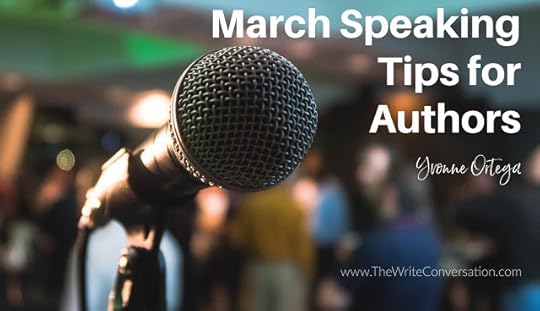
by Yvonne Ortega @YvonneOrtega1
The kid in me wants to speak on all the online calendar topics for the month of March. Let’s look at how this would play out.
First, Stand for ethics all the time.
March is National Ethics Month. According to macmillandictionary.com, “Ethics is a set of principles that people use to decide what is right and what is wrong.” In my stand for ethics, my yes means yes and my no means no.
An example of ethics would be the proper permission for filming at speaking engagements. If I film people online or in person, I need their written permission ahead of time. People have the right to withhold their permission, and I must honor that.
At a live event on resilience, I printed permission forms and took them with me.
In a recent online workshop, Writing About What You’ve Learned So Far in Crisis, the attendees chose not to be filmed or recorded. If I want video recordings of that content, I can record each session by myself. Then I can sell the individual recordings or the entire course at a package price online.
The hosts on the Writer’s Chat interviewed me on the topic of Writing to Heal vs. Writing about Trauma. They have a policy in place for filming. During the recording of the presentation, only the speaker and the hosts are filmed. After the presentation, all other attendees can turn on their video, unmute, and ask questions or comment.
Second, Speak in a foreign language whenever you can.
March is Foreign Language Month. My first language is Spanish, and I speak and sing in Spanish when I can. Every so often, I do a Facebook Live in Spanish. One Christian leader listened to one of them and said, “I don’t speak Spanish or understand it, but I could sense your love and compassion for your audience.
Before I spoke in Spanish at a women’s event in New Jersey, I recorded my testimony in Spanish and duplicated recordings of it to sell there. Their eagerness to take God’s Word home with them filled my heart with joy. The last part of the recording explained how to have a relationship with God the Father through Jesus Christ.
You may know a foreign language or a few phrases in it. Look for opportunities to use what you know in that language. You can use an interpreter. However, you touch the hearts of your audience when you attempt to speak their language.
One friend used what phrases she knew in Spanish and received offers for free tutoring in that language. An Australian friend serves on the mission field in Japan. I respect her efforts to understand the Japanese culture and to teach the people how to write for publication in English.
If your religious or civic organization helps refugees from other nations settle in the United States, you may learn their language in the process.
Third, Take care of your physical body.
March is also National Nutrition Month. I reap the benefits when I eat healthy food and suffer the consequences when I don’t.
I received one body for life on earth. I can trade books, appliances, and cars for new ones, but not my body. So, I remind myself of the seriousness of proper nutrition for my body, the temple of the Holy Spirit.
Aging is a natural process. You and I come with an expiration date. Furthermore, climate changes and accidents can interfere with our best efforts. In the past week, an author friend slipped on the ice and sprained her ankle.
At Christmas time, a woman rushed to get ready for the arrival of her daughter and son-in-law. She experienced a dizzy spell and passed out. After this happened again, she spent time in the hospital and in rehab because of a heart problem and surgery. She’s learned not to ignore warning signs.
During flu season, I wash my hands more often, drink plenty of water, and rest. A power nap of twenty to thirty minutes mid-afternoon helps when I have an evening event.
In summary, my March speaking tips are:Stand for ethics all the time.Speak in a foreign language whenever you can.Take care of your physical body. What will you do to march forward in the month of March and year-round?
TWEETABLEMarch Speaking Tips for Authors - @YvonneOrtega1 on @EdieMelson (Click to Tweet)
 Yvonne’s background as a licensed professional counselor brings a unique perspective into the heart of women. She’s a speaking and writing coach and the owner of Moving from Broken to Beautiful®, LLC. She belongs to the Advanced Writers and Speakers Association, the Christian Authors Network, the National Speakers Association, and Toastmasters International.
Yvonne’s background as a licensed professional counselor brings a unique perspective into the heart of women. She’s a speaking and writing coach and the owner of Moving from Broken to Beautiful®, LLC. She belongs to the Advanced Writers and Speakers Association, the Christian Authors Network, the National Speakers Association, and Toastmasters International.She celebrates life at the beach, where she walks, builds sand castles, blows bubbles, and dances.
March 6, 2021
The Power of Lament in a Writer’s Life

by Audrey Frank @AudreyCFrank
Inspired by Psalm 40
I waited patiently for the Lord
to open a door for my manuscript
He turned to me and heard my cry;
he brought me up out of the slush pile,
out of the miry clay of anonymity.
Then He put a new book in my heart,
a testament of praise to our God.
Many will read and fear the Lord
and put their trust in him.
Blessed is the writer
who trusts in the Lord,
who does not look to platform numbers,
to bestseller lists and Amazon rankings.
Many, Lord my God,
are the wonders you have done,
the true stories you have written in the lives of people.
No story can compare to yours,
were I to write and tell of your deeds,
they would fill more books than the Library of Congress could shelve.
May all who rejected my manuscript
be sorry one day;
May all who said I could not write well
change their minds when they see how far I’ve come.
But may all writers who seek you first
rejoice and be glad in you;
may those who long for your help to write a book always say,
“The Lord is great!”
As for me, I am a poor and needy writer;
may the Lord think of me as I take up my pen.
You are my help and my deliverer;
you are my God, give me your words today I pray.
If Bono can do it, so can I.
On the night he and his band U2 recorded the 1983 album War, Bono flipped open his Bible and read Psalm 40. From its words came the inspiration for what has since become one of U2’s most famous songs, “40,” also known as “How Long.”
Although the song of lament became a fun game of “How long will we sing this song,” Bono appreciated the stirring refrain of a heart crying out to God for help.
According to A Poet’s Glossary by Edward Hirsch, lament is a poem expressing personal loss and grief. Lament was an integral part of many ancient cultures and provided an outlet to express sorrow and disappointment.
In Hebrew tradition, lament was addressed to God and was generally composed of the following five elements: address, complaint, affirmation of trust, petition for deliverance, and praise.
Lament can be a valuable tool for writers. Our journey is often riddled with disappointment and frustration. We can become discouraged and bitter or we can practice lament to navigate our emotions and strengthen our trust in the One who called us to write.
The power of lament in a writer’s life can be seen in the words of King David, author of Psalm 40.
He knew disappointment and sorrow and was painfully acquainted with rejection. Some of the most beautiful laments in Hebrew literature were penned by the shepherd king who was brave enough to share his journey through honest prose. He practiced the art of praising God while waiting for His help to come. He learned to bring his complaints to God and trust Him to work on his behalf.
Complaint on its own, especially when shared with another person, fuels resentment and leads to slander. Complaint poured out to God, however, is safe, for it comes with the marvelous possibility of transformation for both complainer and offender. I think of it as a win-win situation. If the complaint of my heart is misguided, the Lord will change my heart or open my eyes to something I did not understand before. If my offender is the misguided one, the Lord can change her heart or open her eyes.
Either way, like David, I can entrust all that concerns me to God and trust Him to help me.
Biblical lament gives permission to complain. It offers a template for trust. It gives the power to praise. Lament promises, as Michael Card said, “that the path is going somewhere” (A Sacred Sorrow: Reaching Out to God in the Lost Language of Lament).
Some days it feels like the writer’s life is not going anywhere.
Does anyone read my words? Will I ever find a publisher? Do I have the courage to continue writing after that scathing critique? Maybe this is a pipe dream.
Writers would do well to learn the lost art of lament. When we bring our complaints to God, we receive his help. We find patience to wait and persevere through the arduous process of birthing a book. We gain courage to keep going when we want to quit.
Don’t quit today, dear writer. Pour out your lament and look up! Help is on its way.
Why, my soul, are you downcast? Why so disturbed within me? Put your hope in God, for I will yet praise him, my Savior and my God (Psalm 42:5).
TWEETABLE The Power of Lament in a Writer's Life - @AudreyCFrank on @EdieMelson (Click to Tweet) Audrey Frank is an author, speaker, and storyteller. The stories she shares are brave and true. They give voice to those whose words are silenced by shame, the hard things in life that don’t make sense, and the losses that leave us wondering if we will survive. Audrey and her family have spent over twenty years living and working among different cultures and world views, and she has found that God’s story of redemption spans every geography and culture. He is the God of Instead, giving honor instead of shame, gladness instead of mourning, hope instead of despair. Although she has three different degrees in communication and intercultural studies, Audrey’s greatest credential is that she is known and loved by the One who made her.
Audrey Frank is an author, speaker, and storyteller. The stories she shares are brave and true. They give voice to those whose words are silenced by shame, the hard things in life that don’t make sense, and the losses that leave us wondering if we will survive. Audrey and her family have spent over twenty years living and working among different cultures and world views, and she has found that God’s story of redemption spans every geography and culture. He is the God of Instead, giving honor instead of shame, gladness instead of mourning, hope instead of despair. Although she has three different degrees in communication and intercultural studies, Audrey’s greatest credential is that she is known and loved by the One who made her.Audrey is the author of Covered Glory: The Face of Honor and Shame in the Muslim World (Harvest House Publishers), an outpouring of Audrey’s heart to introduce others to the God of Instead. Shame is not unique to the developing world, the plight of the women behind veils, young girls trafficked across borders; shame is lurking in hearts everywhere. Through powerful stories from women around the world, Covered Glory illuminates the power of the Gospel to remove shame, giving honor instead. Available at favorite booksellers: BARNES & NOBLE , BOOKS A MILLION, AMAZON.
March 5, 2021
How to Apply SEO to Your Blog – One Blogger’s Process
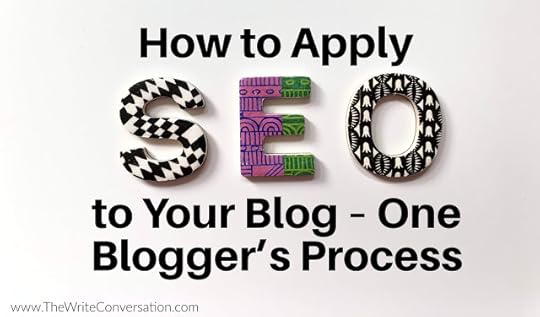
by Edie Melson @EdieMelson
As writers we all have our own unique way of doing things. The same is true of bloggers, we know that SEO (Search Engine Optimization) is a critical part of any successful blog, but the application can be different for each of us. I thought you would like to see this blogger’s process of applying SEO to my blog.
Steps to SEO for My Blog
1. I begin with the topic I want to write about. I’m going to use today’s post as an example. I decided I wanted to share how do SEO for my site.
2. I work on the title. Some bloggers write the title last. I’ve found—for me—by having an already focused and keyword-rich title helps me keep my post on track. For this post, began playing with possible titles and I plugged them into various search engines to see what content came up.
I began with clever titles, because that’s my default as a writer. But clever titles are usually poor choices when it comes to Search Engine Optimization.
A Quick Lesson on Blog TitlesTitles need to reflect the full topic of the post. This is not time to be clever or too generic. Here are three things to remember.
Your readers will evaluate your post's content based on the title. When a title is misleading or even ambiguous, the reader can walk away feeling cheated.The blog title must stand alone—with full context—when shared on social media. For example with this post, I began with A Peek Inside My Mind . At first glance that seems like a pretty good title for someone who is reading a post on a writing site. But what about those doing a search in a search engine or reading the text in a social media update? For them it’s misleading and generic. A better title would be: Get Inside the Mind of a Blogger . But even that falls short. The point of this post isn’t my mind, it’s how to see how a top blogger applies SEO for her site. What makes sense to a reader who has the full content of a blog is much different from what makes sense without visual clues and context. As I realized what my true focus was, I came up with this title: Apply SEO to Your Blog – One Blogger’s Process Side Note: the creative side of my mind hates practical titles. I want to write clever titles that intrigue readers to keep reading. So I often find myself bargaining…with myself. I promise my creative side that if she’ll allow a practical title, I’ll let her be as creative as she wants with bold headings and in the body of the post. The title should contain a phrase that someone would type into a search engine to find the content in your post. This means it should contain your keyword phrase for your entire post. Otherwise, no matter how clever your title is, no one will ever find the post to read it unless they’re already subscribed. As I was brainstorming titles, I refined and set my keyword phrase as How to Apply SEO to Your Blog. It’s not clever, but I can see many people typing that into a search engine. That’s the final piece of the puzzle and when you get it right, will immediately move your post up in a search engine search. 3. I refine the keyword phrase. As stated in the section about titles above, I set my keyword phrase during the process of finding a title. I also find a secondary keyword phrase. In this instance, I have two secondary keyword phrases. SEO for Bloggers and Blogging for Writers.
4. I write my post. Now that I know my post’s focus, I can write to that focus. This will also enable me to use my keyword phrase naturally throughout the post and add authority and credibility to the post when a search engine ranks the content. When I write the post, I use Microsoft Word. This also allows me to have a backup copy of a post if anything happens to erase it.
5. I refine my blog’s formatting. I don’t insert anything except bold headings into the word document, I wait until I load the post into my blog to apply most formatting. Formatting in a Word document doesn’t translate well into the text editor found on your blog.
Formatting includes:Bold Headings: these should reflect the focus of the blog.Bullet Points: an easy way to make information easy to scan and simple to digest. Bullet points are used when the information may be applied in any order.Numbered Lists: same as bullet points. Numbered lists are used when the information is best applied in a specific order.Length of paragraphs: paragraphs should be short to avoid large blocks of text, especially on small mobile devices.6. I copy my finished post into the compose window of my blog. At this point, I apply the formatting I want in my finished post.
7. I insert my tags into the post.These include, but aren't limited to:The Blog Post TitleThe Main Keyword PhraseThe Secondary Keyword PhraseMy NameMy Blog’s Name— as opposed to the title of the individual post (My blog’s name is The Write Conversation)The Blog Post Author’s Name (if it’s a guest post)8. I create the featured image. I look for an image that’s copyright free (I use either www.Pixabay.com or www.Unsplash.com). I also embed the title in the image. This increases the click-thru rate on social media. I save the finished image with the title of the blog post.
So I have two files on my computer: a word document file with the title, How to Apply SEO to Your Blog—One Blogger’s Process.docan image file with the title, How to Apply SEO to Your Blog—One Blogger’s Process.jpegBy saving the image with this file name and uploading it to my blog, I again reinforce the credibility and authority of the content when ranked by a search engine.
9. I check & optimize any hyperlinks. Many bloggers are unaware that hyperlinks used correctly can add SEO ranking. Hyperlinks show up in a search engine search—but only if the linked text is searchable. For example, often we'll see hyperlinks used this way:To learn more about choosing the best blog post title CLICK HERE. The hyperlink would be on the words, click here. The problem with is that no one I know of types CLICK HERE into a search engine to find information about blog post titles. So hyperlinking those words wastes that link. A better way of linking this would be:To learn more about CHOOSING THE BEST BLOG POST TITLE click here. Someone might type in a search about choosing the best blog post title, so now that hyperlink will benefit your overall SEO score.Bottom LineSEO is important to getting your blog found in a generic search. There are multiple ways to achieve this, but I've given a look at how I do it. This is my step-by-step process I use to apply SEO to my blog. I’d love to answer any questions you have and hear how your process works for you.
Don’t forget to join the conversation!Blessings,Edie
TWEETABLEHow to Apply SEO to Your Blog – One Blogger’s Process - @EdieMelson (Click to Tweet)
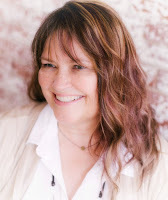 Edie Melson is a woman of faith with ink-stained fingers observing life through the lens of her camera. No matter whether she’s talking to writers, entrepreneurs, or readers, her first advice is always “Find your voice, live your story.” As an author, blogger, and speaker she’s encouraged and challenged audiences across the country and around the world. Her numerous books reflect her passion to help others develop the strength of their God-given gifts and apply them to their lives.Connect with her on her website, through Facebook, Twitter and on Instagram.
Edie Melson is a woman of faith with ink-stained fingers observing life through the lens of her camera. No matter whether she’s talking to writers, entrepreneurs, or readers, her first advice is always “Find your voice, live your story.” As an author, blogger, and speaker she’s encouraged and challenged audiences across the country and around the world. Her numerous books reflect her passion to help others develop the strength of their God-given gifts and apply them to their lives.Connect with her on her website, through Facebook, Twitter and on Instagram.
March 4, 2021
The Dangers of Comparing Yourself to Other Writers
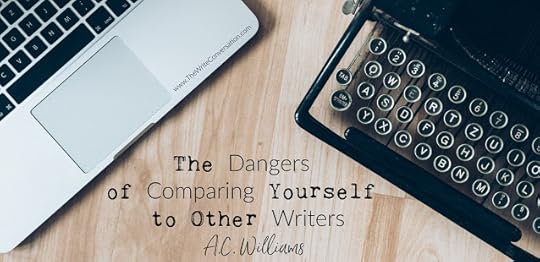
by A.C. Williams @ACW_Author
For my creative writing minor, my college required that I take a poetry workshop. Not going to lie, I dreaded it. I’d never been good at poetry. In fact, the only poetry I’d ever been able to write had been limericks. Light, fluffy, funny, usually irreverent. I’d been told that a person’s skill at poetry was a measurement of the depth of their soul, and that seemed to ring true quite honestly. (Even as a teenager, I wore mismatched socks, dreamed of fantasy civilizations, and choreographed my own lightsaber battles in the back pasture of our farm.)
The poetry workshop actually turned out to be fun, and, God bless her, my poor beleaguered professor extended me such grace and patience. I struggled under the weight of the tiny word count and the expectation of descriptive vocabulary that superseded anything I’d attempted previously. In that semester-long workshop, I confirmed that I was not, nor would I ever be, a poet, but I learned something else too. Something more important.
I learned that I wasn’t a poet. I learned that many of the other students in the room were. And I learned that the creative world was big enough for all of us to not only coexist but to partner alongside each other.
I didn’t have to be a poet to craft beautiful, meaningful stories. Likewise, my very poetic fellow students didn’t have to posit theories of interdimensional travel in order to communicate. Yet as creatives, we often look to our peers and our heroes and fall into the trap of comparison.
We look at Person A’s charisma and energy and feel unequal and frumpy. We look at Person B and recognize his talent, drawing a conclusion that we’ll never measure up. We admire Person C and her extraordinary imagination and believe that our little scribblings fall short.
Funny people want to be deep. Deep people want to be funny. Short fiction writers want to write epics, and epic writers want to be more concise. The grass is always greener on the other side, isn’t it?
But have you ever thought about the burden it would be if you were gifted at everything? Have you ever considered the blessing it is to have a specialty? The simple truth is that if you could do everything, you wouldn’t need anyone. In some cases that might be nice. People can be difficult and challenging, but I’d rather work with a challenging person once in a while and be part of a community than to be self-sufficient and totally alone.
What about you?
God didn’t make us to be self-sufficient. He didn’t create us with the intent of making us good at everything we try. He entrusted each and every one of us with specific talents to serve a specific purpose in His Big Story. It’s really easy to get distracted by wishing we could do something the way our heroes do it, but haven’t you thought about the fact that you can do something your heroes can’t?
You have a story to tell. You have a voice. You have life experience that no one else has. You have perspective and opinion and a remarkable anthem to sing that sounds nothing like anybody else’s. Do you know what that is?
Not an accident.
In an industry overwhelmed with fear of the lack of originality, why on Earth would you want to be like anyone else? God has blessed every communicator with a unique gift. Sure, some of us are more skilled at writing funny stuff. Some of us are more skilled at explaining deep thoughts. Some of us can say more in 50 words than the rest of us can say in 50,000. It doesn’t make one of us better than the other. It makes us different pieces of one whole masterpiece—God’s story.
That doesn’t mean you shouldn’t have heroes. It doesn’t mean you shouldn’t find others to admire and respect and learn from. We all need that. But if your admiration turns to comparison, you’re not doing yourself any favors. Don’t focus on what your heroes do that you can’t do. Instead, look at how God has prepared you in advance to do the work you’re doing right now.
If you’re deep and not funny, embrace it. If you’re not deep but you can make people laugh, use it. Acknowledge that God made you the way you are, and He has a plan to use your gifts for His glory. When that’s what matters to you, it makes no difference if your work makes people cry or laugh, as long as God is glorified.
Don’t disparage your gift, whatever it is. God gave it to you, and He doesn’t give bad gifts.
The next time you are tempted to compare yourself to another artist or creative, stop. Don’t do it. Instead, look to the Lord who made you and ask Him what He thinks about your work. I guarantee He’ll be a lot kinder to you than you are to yourself.
TWEETABLEThe Dangers of Comparing Yourself to Other Writers - A.C. Williams, @ACW_Author on @EdieMelson (Click to Tweet)
 A.C. Williams is a coffee-drinking, sushi-eating, story-telling nerd who loves cats, country living, and all things Japanese. She’d rather be barefoot, and if isn’t, her socks will never match. She likes her road trips with rock music, her superheroes with snark, and her blankets extra fuzzy, but her first love is stories and the authors who are passionate about telling them. Learn more about her book coaching services and follow her adventures on social media @ACW_Author.
A.C. Williams is a coffee-drinking, sushi-eating, story-telling nerd who loves cats, country living, and all things Japanese. She’d rather be barefoot, and if isn’t, her socks will never match. She likes her road trips with rock music, her superheroes with snark, and her blankets extra fuzzy, but her first love is stories and the authors who are passionate about telling them. Learn more about her book coaching services and follow her adventures on social media @ACW_Author.
March 3, 2021
How I Write a Novel

by Lynn H. Blackburn @LynnHBlackburn
I just turned it what will be, Lord willing, my seventh published novel. I’ve come to realize that despite my best intentions, the process always looks something like this . . .
I should start this book, but that blinking cursor looks grumpy. I’ll do some more research into weapons of mass destruction and how to poison someone so it makes them very sick but doesn’t kill them.
I need chocolate.
I should have started this book months ago. This opening scene is amazing. So stressful and tense. My readers are going to be a wreck! Yes! Now, to figure out what happens after this.
I still have no idea what happens next so I’m just going to blow something up and keep writing. Maybe something good will accidentally fly from my fingers and fill the page.
I love these characters. They have such cool jobs and quirky personalities. They are so much fun to hang out with. This is going to be awesome.
I don’t know anything about my characters’ jobs. Why do they have to do things that are classified? How will I ever figure out what a day in their life looks like? I can’t write another word until I do more research.
I.am.bored. If I’m bored, readers will be, too. Is it too soon for a kissing scene? (Answer: No)
I need chocolate.
I still have six months before this book is due. There’s no way I’m going to have any trouble meeting this deadline. I am so on top of things.
I would like to find the person who told me writing was fun so I can throw sharpened pencils at them until they beg forgiveness.
I didn’t see that coming. I love it when my characters do things I didn’t expect. It’s my favorite part of being a writer. I love my job!
I have so many plot threads running loose that I’ll never corral them all. I think I’ll bake a cake and call it research.
I have two months to turn this book in. **looks at calendar** I am in big, big trouble.
I need chocolate.
I want these characters to be real so I can hang out with them forever. I’m going to miss them so much when I finally type THE END.
I’m almost at my word count, but I have no idea how this book is going to end. I’m not even sure who the bad guy is.
I’ve lost the ability to spell random words. Not words like perspicacious (which I just spelled correctly on the FIRST try), but words like squawk which took four tries (and the thesaurus had to suggest the correct spelling before I got it).
I need chocolate.
I am one week away from my deadline. I’m crying in grocery stores, at church, in my car, and while thinking about the book. I don’t want to think about this book anymore. At all. Ever.
I don’t have enough time to do this. I know! I’ll clean out the pantry and reorganize my closet.
I need chocolate.
I have three days to finish this. I have the best idea ever for a new series. I won’t be able to start writing it for at least two years, so I’d better jot down all my thoughts now so I don’t forget them.
I can’t remember the taste of strawberries. (Come on, where are my Lord of the Rings fans)? Do people have jobs that don’t come with a yearly existential crisis? I need to find one.
I have no idea how I did this. Truly. I’m done. THE END. Praise the Lord. I don’t care if I ever write another book. Ever.
I hope my editor likes it.
I need a lot of chocolate.
Hmm….that blinking cursor on that blank page looks grumpy, but this opening scene is going to be awesome and these characters are so cool…
Grace and peace,
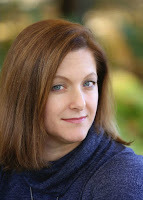 Lynn H. Blackburn loves writing romantic suspense because her childhood fantasy was to become a spy, but her grown-up reality is that she's a huge chicken and would have been caught on her first mission. She prefers to live vicariously through her characters and loves putting them into all kinds of terrifying situations while she's sitting at home safe and sound in her pajamas!
Lynn H. Blackburn loves writing romantic suspense because her childhood fantasy was to become a spy, but her grown-up reality is that she's a huge chicken and would have been caught on her first mission. She prefers to live vicariously through her characters and loves putting them into all kinds of terrifying situations while she's sitting at home safe and sound in her pajamas! Lynn’s titles have won the Carol Award, the Selah Award, and the Faith, Hope, and Love Reader’s Choice Award. Her newest series kicks off in March 2021 with Unknown Threat, Book 1 in the Defend and Protect series.
She is a frequent conference speaker and has taught writers all over the country. Lynn lives in South Carolina with her true love and their three children. You can follow her real life happily ever after by signing up for her newsletter at LYNNHBLACKBURN.COM and @LynnHBlackburn on BOOKBUB, FACEBOOK, TWITTER, PINTEREST, and INSTAGRAM.
March 2, 2021
Mind-mapping: Using the Way We Think to Create Story

by Sarah Sally Hamer @SarahSallyHamer
I'm going to make an assumption here. You are probably very similar to the other 7.674 billion +/- people in the world. So you probably also think like everybody else. Not the same thoughts or in the same language or with the same result, but in the same way.
Most of the people I know were taught to put general ideas about a subject down in a linear fashion:
Subject of paper
I. Main idea
1. Subsidiary idea #1
a. Sub idea #1
b. Sub idea #2
i. Sub/sub idea #1
ii. Sub/sub idea #2
2. Subsidiary idea #2
3. Etc., etc., etc.
Right? Everything had to go in line, perfectly pre-determined and perfectly spelled. If you made a mistake or forgot/overlooked something, you had to start over.
But that is NOT how we think!
Almost every human is an associative thinker, although there are certainly some who have had it beaten out of them. Our brains have trillions of connections, put together in very specific—and unique—ways. Each neuron is associated with hundreds or thousands of others, based on what they have in common. For instance, the word “elephant” immediately brings a series of ideas to our consciousness. Most people have a commonality with certain aspects of elephants—size, shape, color, smells, sounds they make. Each of these is connected to each other in our brain and brings up memories. For me, I would add in peanuts. We got to feed the elephants with sacks of peanuts when I was a kid, and the emotions of excitement and pure joy are also associated with elephants and just seeing a picture of an elephant will make me crave a peanut butter sandwich.
Because we think in pictures and wild imaginings and fantastical ideas, we also create stories that way. A mind map is a simple tool that utilizes the way our brains work to capture the ideas floating around in our heads. It can free up your thinking, help you to collect knowledge and information, and create new pathways of creativity. It might even make you a better thinker!
To start off with a mind map, you need to know what you want. When I write a story, or even a blog like this one, I draw an oblong in the middle of a sheet of paper and put my story/blog title there. Next, I brainstorm. What is important in a story? The characters and plot, right? So I draw more oblongs in a circle around the title oblong, adding the names of the characters I know I'll be using. Susie, John, Ben – however many I know about. Then I'll start describing them, adding goals, motivations, conflicts, character traits, physical traits, and anything else I can think of. I may know that Susie and John are dating, so I can add a scene (in a few words) about an argument they have. Ben may fight with John over Susie, and that goes in. I can add other plot ideas as I go, simply by adding more oblongs and moving them around (it's not as easy on paper as on a computer to move things but you can draw lots of arrows and use different colored ink as needed). You can even add information on the setting. Or anything else, for that matter.

Ultimately, what you're doing is telling your story in a non-linear way. Not a Roman numeral to be seen! What happens with me is that, after a little bit, ideas start flowing (actually, they are "associating") and I find that the plot just streams out of me. I add something in one place and a new scene leaps into my mind so I quickly jot it down. Or a character trait I hadn't thought of jumps out. Even new characters can show up when we need them.
It's so easy! You can, of course, use paper. That's usually where I start. But there are lots of software programs available, from free to very expensive, depending on the complexity. The one I used for the attached diagram is Scapple, which is relatively inexpensive.
I hope you'll try the process and see if you find value in it like I do. I'd love to hear about your experience!
TWEETABLEMind-mapping: Using the Way We Think to Create Story - @SarahSallyHamer on @EdieMelson (Click to Tweet)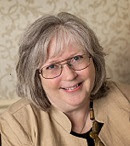 Sarah (Sally) Hamer is a lover of books, a teacher of writers, and a believer in a good story. Most of all, she is eternally fascinated by people and how they 'tick'. She’s passionate about helping people tell their own stories, whether through fiction or through memoir. Writing in many genres - mystery, science fiction, fantasy, romance, medieval history, non-fiction – she has won awards at both local and national levels, including two Golden Heart finals.
Sarah (Sally) Hamer is a lover of books, a teacher of writers, and a believer in a good story. Most of all, she is eternally fascinated by people and how they 'tick'. She’s passionate about helping people tell their own stories, whether through fiction or through memoir. Writing in many genres - mystery, science fiction, fantasy, romance, medieval history, non-fiction – she has won awards at both local and national levels, including two Golden Heart finals. A teacher of memoir, beginning and advanced creative fiction writing, and screenwriting at Louisiana State University in Shreveport for almost twenty years, she also teaches online for Margie Lawson at www.margielawson.com. Sally is a free-lance editor and book coach at Touch Not the Cat Books, with many of her students and clients becoming successful, award-winning authors.
You can find her at hamerse@bellsouth.net or www.sallyhamer.blogspot.com
From Sally: I wish to express gratitude to the giants upon whose shoulders I stand and who taught me so much about the writing craft. I would list every one, if it were only possible.
March 1, 2021
Discover the Take-Home Value of Your Writing

by PeggySue Wells @PeggySueWells
How does your writing—idea, message, or story benefit your audience? Why would your reader trade their hard-earned funds to purchase your project? Why would someone invest their limited time to read your writing?
In other words, what take-home value do you provide?
Types of take-home value writers offer include AnalysisEducationEmotionEncouragementExperienceGuidanceInformationInsightInspirationInstructionIntroductionMotivationOpinionReportTransformationConsumers particularly appreciate entertainment and humor. As standalones or combined with items in the list above, entertainment and humor are perfectly respectable – even admirable – take-home values to give your audience.
Like Mary Poppins’ spoonful of sugar helps the medicine go down, humor is a disarming delivery vehicle. Dave Barry and Martha Bolton couched plenty of insights about people in laugh-out-loud humor.
Grand master of the American action adventure novel, Clive Cussler made the New York Times bestseller list more than 20 times writing highly entertaining stories that have been published in 40 languages and in 100 countries. For this fan, besides marveling at the author’s bold and audacious plots, I return to his work for therapeutic recovery when life becomes too real. Similarly, the multibook Hank the Cowdog series, and Winnie the Pooh are trustworthy go-tos featuring beloved and familiar characters, and always a happy and satisfying ending.
Pamela and Bill Farrel consistently encourage readers to build strong marriage relationships anchored on Biblical principles. Linda Evans Shepherd provides a solid blue-print for prayer. June Hunt delivers practical counsel for healthy living. Think of the authors you return to. Why do you like that author’s work? The answer to that question identifies the take-home value that author delivers.
When you pen a project to be viewed and consumed by others, you create an exchange. You expect your audience to read your writing. Your audience expects you will make the experience of reading your work worthwhile. To keep your end of the agreement, clarify the benefit you plan to provide. Purposefully and generously give your audience abundant take-home value.
TWEETABLEDiscover the Take-Home Value of Your Writing - @PeggySueWells on @EdieMelson (Click to Tweet)
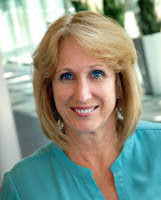 Tropical island votary and history buff, PeggySue Wells parasails, skydives, snorkels, scuba dives, and has taken (but not passed) pilot training. Writing from the 100-Acre wood in Indiana, Wells is the bestselling author of twenty-eight books including The Slave Across the Street, Slavery in the Land of the Free, Bonding With Your Child Through Boundaries, Homeless for the Holidays, and Chasing Sunrise. Optimistic dream-driver, PeggySue is named for the Buddy Holly song with the great drumbeat. At school author visits, she teaches students the secrets to writing, and speaks at events and conferences. Connect with her at www.PeggySueWells.com, on Facebook at PeggySue Wells, and Twitter @PeggySueWells.
Tropical island votary and history buff, PeggySue Wells parasails, skydives, snorkels, scuba dives, and has taken (but not passed) pilot training. Writing from the 100-Acre wood in Indiana, Wells is the bestselling author of twenty-eight books including The Slave Across the Street, Slavery in the Land of the Free, Bonding With Your Child Through Boundaries, Homeless for the Holidays, and Chasing Sunrise. Optimistic dream-driver, PeggySue is named for the Buddy Holly song with the great drumbeat. At school author visits, she teaches students the secrets to writing, and speaks at events and conferences. Connect with her at www.PeggySueWells.com, on Facebook at PeggySue Wells, and Twitter @PeggySueWells.
February 28, 2021
How to Prevent Paper-Cut Words

By Kristen Hogrefe Parnell @khogrefeparnell
At what point do you print out a work-in-progress to give your red pen something to scribble on? Personally, I can only do so much editing on screen before I need to see the words on paper.
The other night, I was proofreading one such draft when I turned the page and SLICE! It slit through my pointer finger, leaving an almost invisible but truly painful papercut.
I see you wincing along with me.
Papercuts hurt in real life, but our words have even more potential to cut. They also have the ability to heal, but it’s not the healing words that usually slip out without warning. It’s the hurtful ones.
How can we prevent papercuts on our hands and others’ hearts?
Turn the pages and our tongues slowly.
If I hadn’t been in such a hurry to flip the page, I wouldn’t have cut myself. In my impatience to finish the chapter, I ended up delaying my progress with a papercut.
Scripture says that our tongues have the potential to set fires. “Even so the tongue is a little member and boasts great things. See how great a forest a little fire kindles!” (James 3:5 NKJV). My twin brother is a wildland fire fighter, and he knows better than anyone how one match or one lightning strike can result in a firestorm.
Our words can be like that too. One hasty or thoughtless word can be the match that lights an inferno of troubles, hurt feelings, or distanced relationships. However, if we turn our tongues slowly and think before we react, we can stop that fire by never letting it start.
By tongues, I mean both our spoken and written words. As writers, we know the pen is mightier than the sword, and sometimes, our wit can come across as too sarcastic. According to Merriam Webster, the Latin etymology of sarcasm is "to bite or strip off flesh.” In other words, it literally means “cutting flesh.” Let’s take care so that our words don’t cut down but build up.
Think twice before we strike.
When I’m frustrated with a scene that isn’t working, I usually yank out my red pen and start tearing the page apart with markings.
Later when I’m sitting at my computer trying to decipher my frustrated markings, I get doubly frustrated. The labor of having to untangle my notes becomes almost as challenging as the task of rewriting the scene.
A better approach with editing—and with our words—is to think twice before striking. If I’m frustrated with a scene, I should flag that part for later when I have a more patient attitude to approach it. If someone personally rubs us the wrong way, perhaps we would do well to practice the same patient approach and give the Holy Spirit time to help us discern how best to respond.
If you’re finding yourself having to bite your tongue or watch your words, personalize this prayer from Psalms to your situation.
“Let the words of my mouth and the meditation of my heartBe acceptable in Your sight,O Lord, my strength and my Redeemer” (Psalm 19:14 NKJV).
As writers, we should want God to be pleased with our words. Regardless of the circumstances, let’s choose our words carefully and intentionally to prevent unnecessary cuts.
TWEETABLEHow to Prevent Paper-Cut Words - @KHogrefeParnell on @EdieMelson (Click to Tweet)
 Kristen Hogrefe Parnell is an award-winning author and life-long learner. An educator and mentor at heart, she teaches English online and is an inspirational speaker for schools, churches, and podcasts. Her young adult dystopian novels, The Revisionary and The Reactionary, both won the Selah for speculative fiction, and she is working on several new projects, including a romantic suspense novel. Kristen and her husband live in Florida and enjoy sharing their lake home with family and friends. She blogs at KristenHogrefeParnell.com where she challenges readers to find faith in life’s everyday adventures.
Kristen Hogrefe Parnell is an award-winning author and life-long learner. An educator and mentor at heart, she teaches English online and is an inspirational speaker for schools, churches, and podcasts. Her young adult dystopian novels, The Revisionary and The Reactionary, both won the Selah for speculative fiction, and she is working on several new projects, including a romantic suspense novel. Kristen and her husband live in Florida and enjoy sharing their lake home with family and friends. She blogs at KristenHogrefeParnell.com where she challenges readers to find faith in life’s everyday adventures.



